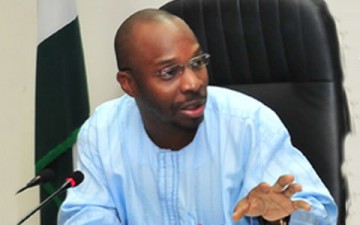
Statistician-General-of-the-NBS-Dr-Yemi-Kale
The National Bureau of Statistics (NBS) recently released Nigeria’s Gross Domestic Product (GDP) growth rate report for the first quarter of 2018. The report reveals that the economy has shrunk from 2.11 per cent in the fourth quarter of 2017 to 1.95 per cent in the first quarter of this year. The NBS states that the latest report shows a stronger growth when compared with the first quarter of 2017 which recorded a growth of –0.91 per cent indicating an increase of 2.87 per cent points. However, the figures also indicate a decline of –0.16 per cent when the performance of the economy in the last quarter is compared with the preceding quarter.
While on the subject, it is only appropriate to commend the Nigerian Bureau of Statistics (NBS) under the leadership of Dr. Yemi Kale for the visible improvements in the activities of the bureau. The agency has not only been consistent with their informative and insightful data; they have presented the data to the public in accessible, readable and interactive format. Before now, it was really difficult to obtain data about Nigeria from the NBS; however, positive events have taken over under the current leadership. The NBS again validates the position that government agencies can function optimally with the right kind of leadership.
The latest report has elicited reactions from observers and especially economic analysts. Many factors may have affected the dip in the GDP and it may be difficult to pin the decline to one supreme factor. Some have alluded to the delay in passage of the budget and the attendant uncertainties that may have deterred concrete investment. There is yet another school of thought that believes the weakening GDP growth is reflective of the decline in the trade sector which accounts for a significant percentage of our GDP. Whilst it is very important to analyse the factors responsible for the decline, perhaps it is more imperative to consider what the current report suggests and portends for Nigeria’s future. An important aspect to note is that whilst the oil sector grew 14.7 percent year-on-year in the first quarter of 2018; non-oil sector advanced 0.7 percent, after increasing 1.5 percent in the previous period. Agriculture that has often been a significant feature of our GDP fell from 4.2 percent in Q4 2017 to 3.0 percent in Q1 2018. It is instructive to note that agriculture is responsible for over 20% of what is being produced in Nigeria and employs more than any other sector in the country. Similarly, the construction sector fell from 4.1 percent in the preceding quarter to -1.5 percent in Q1 2018. The usually vibrant arts, entertainment and recreation sector sloped from 3.5 percent in Q4 2017 to 0.3 percent Q1 2018. The trade sector diminished from 2.07 percent in Q4 2017 to -2.57 percent in Q1 2018. The same scenario is replicated in many other sectors of the economy.
The latest report already suggests that Nigeria is lagging behind in our growth forecast for the year which was pegged at 3.5 per cent in the 2018 budget and the 2.5 per cent predicted by the World Bank. As we expect and hope for subsequent reports to be positive, it is important for the government to push for reforms that will push the country to attain double digit growth, which has eluded Nigeria in recent times.
There is clearly an inseparable link between politics and the economy, which presupposes that the political atmosphere affects the economy and vice versa. Often times, the GDP naturally dips in the year preceding elections because of the uncertainties that define the business environment. The build up to the 2019 elections portend concerns for investors because every businessman endeavours to reduce the magnitude of uncertainty characterising his investment decisions. To that extent, it is incumbent on all Nigerians to ensure peace in the elections. Without sounding rhetorical, the government is expected to lead the charge in this regard. We must let the world know that elections are not do-or-die affairs in Nigeria, and we are not condemned to go into crisis before and after elections. When security of lives and investment is guaranteed, investors are further interested in funds accessibility. This is why the Central Bank of Nigeria (CBN) needs to aid investment by championing the possibility of lower interest rate. Lower interest will spur more individuals to borrow and invest in the country especially those sectors that add significant value to our GDP. Agriculture being an important sector of the GDP requires more attention. The renascent conflict between farmers and herders across the country is surely impacting the GDP. Governments at all levels must collaborate to find a lasting solution to this age-long conflict.
The positive thing about the latest report is that for the fourth quarter consecutively, the economy has grown steadily but we must continue to work hard to guide against a steady decline.